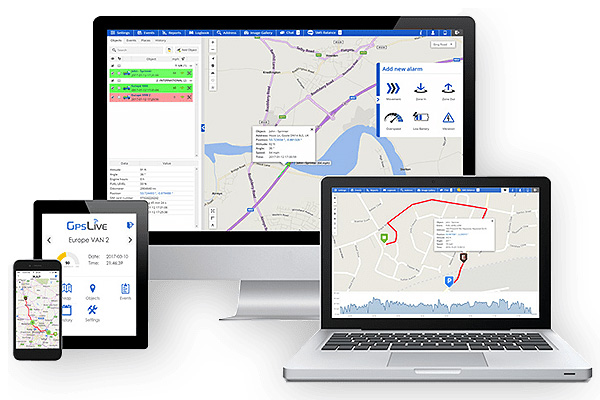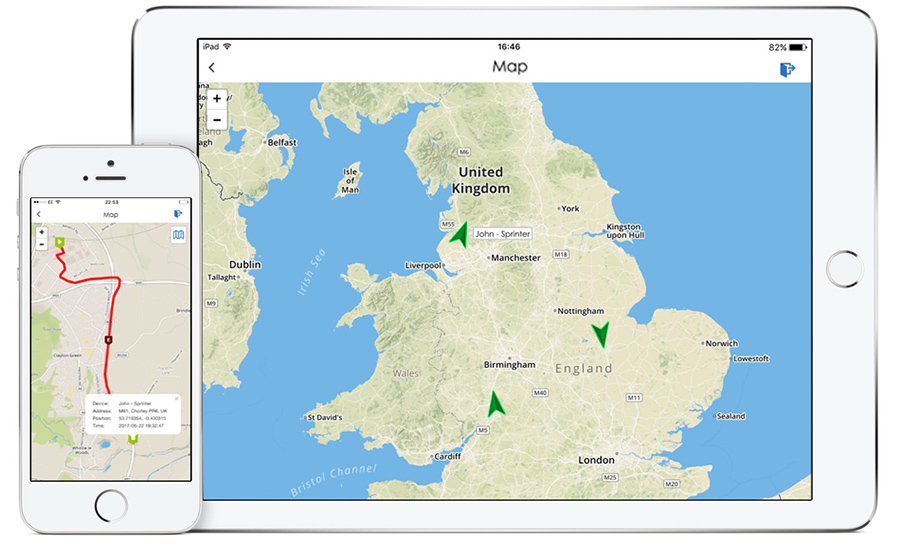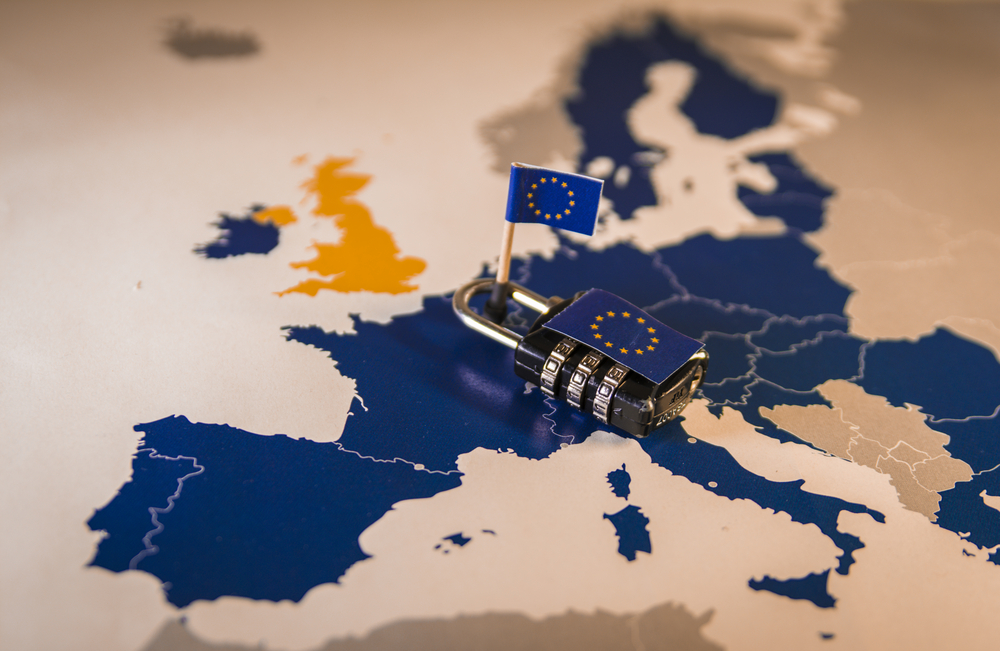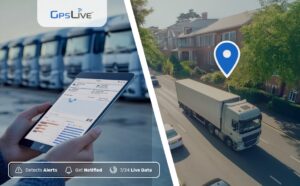GPS tracking has become a source of security for businesses and individuals, allowing them to view their vehicles and assets on a digital map. While this could be regarded as an invasion of privacy, thankfully, there are laws in the UK to protect the privacy of individuals. These laws on personal privacy alleviate our worries; however, there are no specific laws in the UK regarding GPS tracking. Here, we examine the law with regard to GPS tracking and discuss when GPS tracking is legal and when it is not.

What Is GPS Tracking?
GPS tracking refers to placing a GPS tracker in an asset or vehicle to track and record its movements. The tracker records the geo-location of the asset or vehicle and transmits it to a cloud-based server to be viewed on a digital map. Installing a GPS tracker allows you to see the exact position of that vehicle at any given time, as well as a detailed history map that you can view from your computer or smartphone. GPS tracking of vehicle fleets has had a positive effect on improving their safety and security.
The laws in the UK do not specifically address the use of GPS tracking devices, although several laws are governing the use of GPS technology as it is considered a surveillance tool. If an individual can be identified using some information, this information is considered personal data. The Data Protection Act 1998 defines the information gathered by GPS trackers as personal data; this data must be dealt with in accordance with the law.
A business must inform drivers before installing vehicle tracking devices. Informing employees of your intention to install trackers on their vehicles creates a level of trust. The trackers aren’t intended to be a tool to spy on them, but rather to assure their safety and wellbeing while on the job. You can even use this opportunity to remind them of your legal obligation toward their safety.
In the United Kingdom, the law expects businesses with fleets to ensure the safety of their drivers. One of the ways a fleet manager can improve safety is by tracking the movements of vehicles and helping the drivers adjust and improve accordingly. Vehicle tracking gives insight into a driver’s state of mind and their level of fatigue, even when they will not admit to it.

Is Vehicle Tracking Legal?
Yes and no, depending on how you use the GPS tracker. Tracking someone else’s car without their consent is definitely illegal. However, if you track what’s yours or inform your employees of the installation in a business fleet and safeguard the data collected as per the law, it’s legal. If you fail to alert your employees or use the information to victimize them, you will have trouble with the authorities.
To answer this question definitively, you have to examine all the related laws provided by the United Kingdom government below:
The Data Protection Act 1998 is in place to protect all essential data collected by companies and to specify that all employees have a right to know about the information being stored and processed about them. The Data Protection Act dictates that all personal data must be processed lawfully and fairly while personal data has to be obtained for specified and lawful reasons.
The rules may seem complicated, but they are crystal clear regarding vehicle tracking devices and the information they gather. Managers have a responsibility to distinguish and state whether the information is business or personal and whether the company is using it lawfully to improve their business with the consent of their employees. As long as a company is within the boundaries of the law, and doesn’t share personal employee data or use data without consent, it is completely legal for a company to track their business vehicles and drivers.
Protection from Harassment Act 1997
Regulation of Investigatory Powers Act 2000

GDPR 2018
In the recent regulation, the EU and UK governments increased the penalties for failing to protect personal data. Companies can still store personal employee data on secure servers and use it to improve their business, but they need to check whether the proper consent to gather, store and process that data was gathered. As of 25th May 2018, businesses must ensure that the consent given for all data – even that collected before the change – meets the new protocols. In other words, employees will have to re-consent to their data being used in any capacity.
The new principles relating to the processing of personal data dictate that personal data shall be:
1- Processed lawfully, fairly and in a transparent manner in relation to the data subject.
2- Collected for specified, explicit and legitimate purposes and not further processed in a manner that is incompatible with those purposes; further processing for archiving purposes in the public interest, scientific or historical research purposes or statistical purposes shall, in accordance with Article 89(1), not be considered to be incompatible with the initial purposes.
3- Adequate, relevant and limited to what is necessary in relation to the purposes for which they are processed.
4- Accurate and, where necessary, kept up to date; every reasonable step must be taken to ensure that personal data that are inaccurate, having regard to the purposes for which they are processed, are erased or rectified without delay.
5- Kept in a form which permits identification of data subjects for no longer than is necessary for the purposes for which the personal data are processed; personal data may be stored for longer periods insofar as the personal data will be processed solely for archiving purposes in the public interest. Scientific or historical research purposes or statistical purposes in accordance with Article 89(1) subject to the implementation of the appropriate technical and organizational measures required by this Regulation in order to safeguard the rights and freedoms of the data subject.
6- Processed in a manner that ensures appropriate security of the personal data, including protection against unauthorized or unlawful processing and accidental loss, destruction or damage, using appropriate technical or organizational measures.
7- The controller shall be responsible for, and be able to demonstrate compliance with the previous six principles.
Conclusion
In the UK, the primary rule is to reach out to law agencies and authorities to get a definitive answer for business uses of Vehicle Tracking systems. Vehicle tracking is legal within the boundaries as long as drivers and other employees know they are being tracked, this means that businesses are allowed to install tracking devices on their vehicle fleet, but they must inform all of their personnel immediately and acquire consent for collecting data. There are no exceptions to this law, other than in law enforcement and government agencies in which covert trackers may be needed for investigations.
The Information Commissioner’s Code of Practice for Employees is clear on how the employee should be treated; it is clearly stated that the employee has the right to know about any methods used to monitor them. It also favours methods with the least intrusion of privacy and suggests that employees should only be monitored during working hours, with the option of switching off surveillance tools during private time.
You will be within the law to track vehicles solely used for business tasks, provided the driver is aware of the GPS tracking device. You are allowed to monitor mileage, driver behaviour, hours on the road, and the routes used. Almost anything goes here, as long as the vehicle is designated for business use. Personal tracking devices must only be used with consent from the person being tracked.
This article is written merely for informative purposes based on the information provided by the UK government online at legislation.gov.uk. For a definitive answer on what’s legal or not please seek legal assistance and check out the full legislation provided by the Government of the United Kingdom at legislation.gov.uk.




[…] Check out this blog covering the laws on GPS tracking in the UK. […]
I’m a driver for a car rental company near Newcastle. We are allowed to take rental cars home after we finish our last job to save us going back to the depot. We’ve been told we can stop off on the way home if we need to, but not to go too far off course. I had to stop off at a school open evening which was on my way home, I was there an hour.
The next day I was called in to the office and now face losing my job. They had tracked me. I explained the situation but have handed my notice in now over this. Is this legal?
Can a tracker tell how many people are travelling in the car
Thank you for your question. One of our team will be in touch via email shortly.
Hi, I recently had my work van stolen, when I asked for the tracking information from Mercedes I was informed that they couldn’t give it to me due to the data protection act….as the thief fell under the act. So what is the way around this, I want to be able to track my vans but no point if I’m not allowed to track them if stolen?
Thank you for your question. One of our team will be in touch via email shortly.
Thank you for getting back to me. I forgot to say my employer had the trackers fitted on a fleet of hire vehicles. They are getting in touch with employees for going a couple of miles over the limit. And saying the insurance will be void if you do so.
Cheers Paul.
Hi I’ve recently had a tracker fitted on a hire vehicle. If I go over the speed limit slightly will I still be insured.
Thank you for your question it is hard for me to answer your question directly. But if you were to ask me ‘Can an insurance company access my GPSlive tracker and travel data without my authorisation?’I would answer no they can not unless you give them access.
Hi, I have a quick question. How much time does a company store my location data after that I terminated my contract. Can I ask for the deletion of my data immediately ?
Hi. We keep tracking data for a rolling 12 months on GPSLive. You can permanently delete your tracking data at any point from your GPSLive account.
I put a tracker on my car which the ex wouldn’t give back. It’s currently with my solicitor to go through civil court to return the vehicle.
I have the logbooks in my name. Also proof of purchase. He found the tracker and now trying to get me arrested and press charges for stalking and harassment. Before I placed the tracker as I read I was the owner I didn’t think I was in the wrong. Can I get charged for this thanks
Hi, Our trackers are sold to track your own vehicle for security reasons. I’m afraid we are not in a position to comment in these circumstances and would advise you to seek professional legal advice.
Can an employer use a vehicle’s tracker to check your timesheet
Hi can your employer make you wear a tracker on your person ie on your clothing
Is it a breach when a company installs a tracker in a company vehicle that was given to you 1 year before which includes personal use. No policy be handed over, all I got was a tracker will be installed.
Can a company use a tracker as a clocking in and out tool ?
Hi David,
Some companies use trackers for clocking in and out with the help of geo-fence zones: https://www.rewiresecurity.co.uk/blog/benefits-of-geofences
But still, they will have to make sure their employees are aware that they are being tracked.
I have a vodaphone tracker fitted to my own van for security, is it possible that insurance companies can “spy” on this information?
Can an employer track my personal use out of hours when the vehicle is allowed to be used for personal use?
Hi Philip,
If the employer owns the vehicle and it does not belong to you, they are entitled to keep track of their property with your knowledge. There will be a limit or cost implication in relation to a company car owned and used for personal use. For instance perhaps 50 miles per week personal use is acceptable and affordable to the car owner, but should you choose to drive the vehicle hundreds of miles, it is likely you will be liable for wear and tear costs of the vehicle and perhaps fuel if a company fuel card is used).
Can a manager use the van tracker to basically spy on where I am for purposes of having a go when I’m driving around during work hours as a personal attack. I also have a tracker (life 360) on my work phone that I wasn’t aware of and nor was other employees, isn’t that illegal? I’ve never signed anything for the van tracker nor the phone either
Should the employer have me sign a consent form for them to track where i am in there van ?
Can my employer use a tracker log to pay my wages(hours of work)
Hi Adrian,
Your employer should be paying you specifically in line with the terms of your contract employment.
Can a company put a tracker in my own van that I use for their work?
I would interpret the law Mark to advise that if you are using your own van and if your are employed by / working on behalf of that company, the company are allowed to install and use a tracker on your van as long as a) they inform you and b) you are only tracked during the hours you are working for them.
The employer must not track you during private or personal hours.
The employer must keep and hold the tracker data obtained in line with the strict GDPR guidelines.
Hi just have a quick question if the person was rententing thier personal vehicle to a customer and they installed a tracking device only just for emergency purposes for theft would that be considered illegal to do
Hi Dan, If they notice the customer that they have placed a tracking device in the car for emergency purposes, no it wouldn’t.
But it’s always a good idea to get more information from a lawyer.